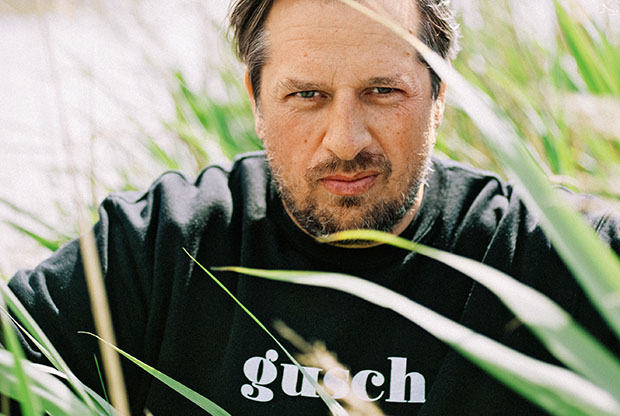
Christian Tschida: A Touch of Madness
Original article: https://www.alacarte.at/
Madmen like star sommelier Mads Kleppe look behind the curtain, taste every barrel, check every stone in the vineyard to bring only the best wine to Copenhagen. Nothing remains hidden. "I am naked," says the winemaker. In the end, his wines are also naked; nothing should cover up their essence.
"My cellar is not an aromatic institution," he says. If you put on a show in the vineyard like he does, it doesn't need any fixing. The controlled diet he has prescribed - leave out as much as possible. But diet does not mean complete renunciation. He has learned that wine does not fly from the vine to the glass. Constantly turning various wheels in the machinery means countless considerations, experiments, and decisions. It also means deciding to let something be. "Over time, you develop a sense of when to intervene and when to walk away," he believes. Another essential "wheel" is probably his grape press, "the Rolls-Royce of presses." A luxury he had to save up for years to afford. He did not receive a grant, as according to the authorities, it was not a "measure to improve quality."
The equipment from France is perfect; grapes cannot be pressed any more gently. No inferior juice comes out of the press. Only the free-run juice becomes wine. It is also crystal clear and free of bitter substances - pure juice in homeopathic quantities. In any case, it is an expensive process. And then everything is left to run its course, laissez-faire: spontaneous fermentation, maturation without intervention, without additives. In large wooden barrels. The wine is not masked in barrique barrels and is not locked in stainless steel tanks.
The wines can breathe. They leave an impression, an impression of the vineyards. The view down to the lake, the chirping of crickets, the summer sun, the gentle breeze. And then you step back into the streets of Illmitz, past well-kept front gardens and gloomy facades that may hide abysses, or perhaps nothing special.But he also demands a lot from his vines: they are planted close together, sometimes even in a double planting system, i.e., two plants side by side with no space between them, in constant competition for water and nutrients. So he forces them to go deep. It's a demanding effort with the lowest yields, but what comes out is in a class of its own. A touch of madness.
On top of all that, the vines are not tied to wire mesh, but are only attached to sticks and enjoy a considerable amount of freedom. This year, grapes will be harvested here for the first time. Tschida owns 14 hectares of first-class vineyards, mostly large areas in a row, so the effort is worth it. Or, as Tschida says, "a necessity to achieve results."
Even in hot years, wines from Purbach do not celebrate baroque orgies; these years only increase their aromatic concentration. A "flavor explosion" if the harvest is successful at the ideal time—ripe but not overripe, lots of acidity, low alcohol. Tschida has mastered the art of wrestling not only with taste but also with freshness in an increasingly dry Pannonian climate. This art has become his trademark.
His Pinot Noir also comes from Purbach, for example from Edelgraben, where limestone reigns supreme. Large pieces of limestone penetrate the surface beneath the vineyards. "Nothing but a pile of stones," people say. "A world-class location," says Tschida. It is rough to drink, sharp as a razor, very red, with little taboo. Pinot from Thenau, on the other hand, is cheerful to melancholic.
Eisner, containing slate, gives Pinot fire and blood. Frighteningly beautiful and full of pain, it descends into the deepest depths where demons live. This is not a wine for the faint-hearted. Blue velvet. More dream than reality. In the end, all three layers disappear in the cuvée, only to reappear in different sensory sequences - opposites in perfect balance.
Tschida is not interested in single-layer fetishism, which only attracts again thanks to small sensory impressions. He wants to create nothing less than a large, complex whole. In addition, he does not want to work year after year for tasting committees that decide on the classification of wines. Without their official statement, the place of origin cannot be indicated on the bottle in the name of the wine. Without this statement, you have to cleverly hide the origin of the wine in its name, and people then have to figure out where the wine comes from based on the name. But Tschida has no desire to create riddles on the label. And so his wines have apt names such as Felsen, Kapitel, or Non Tradition and labels by cult artists, such as Himmel auf Erden (etching by Alfred Hrdlička), on which the young Schubert can entertain himself with revealing women. Or his latest success, Birdscape: a gloomy scenario like something out of Goya's nightmares, in which sleep gives birth to monsters that stare at you from countless bird eyes.
Birdscape Hell Rot is initially a cheerful wine, a macerated rosé on its way to becoming a red wine. The winemaker calls it "pink maceration." But no pleasure is without seriousness, no excitement without tremor. The result is a contradiction that runs through Tschida's work, a dichotomy that must be endured as in everyday life.
Where does Tschida's self-evident belief that he is among the best, his desire to be unique, his compulsion toward contradictions come from? "It's a matter of character," he believes, "perhaps my positive naivety that good will ultimately prevail in the world."
Tschida is a man who also points to his cracks, in which doubts and pressure to meet his own demands—and probably also external expectations—gnaw at him again and again. Christian Tschida is different. His relentless demands and unmistakable instinct for taste have taken him to the top—where things are anything but cozy. That's why Mr. Laissez-faire (who interferes as little as possible in wine production) doesn't want to leave anything to chance.
Ilmitz is one of those typical places in Burgenland that always look a little deserted. If it weren't for the sweaty cyclists pedaling through the empty streets from time to time during the warm season, one might believe that every human soul had left the community on Lake Neusiedl. In their colorful cycling jerseys, they look like exotic birds next to the gloomy facades of the family houses.
Only the bright white old courtyard is out of place. Next to the uniform houses with their carefully tended front gardens, it looks like a relic from another century. Next to the entrance gate, simple silver letters spell out CT—the initials of Christian Tschida.
Tschida has always been a little different from the others, always standing out from his surroundings. And that hasn't always won him friends. Some consider him arrogant and reserved. In reality, the winemaker is disgusted by ignorance and mediocrity. And he makes that clear when he has to. But he also applies these strict rules to himself. His wines should not just be good, but brilliant; their taste should not just meet expectations, but fascinate. These are demands that sometimes wake him from his sleep, but they are also what have brought him to the top.
In Austria, he is considered an outstanding winemaker, and internationally he is celebrated as a pop star. Scandinavians in particular have fallen in love with him. At Copenhagen's iconic restaurant Noma, you'll be hard-pressed to find a menu without wine from Tschida. Head sommelier Mads Kleppe, the driving force and guru of the natural wine scene, makes several trips a year to Illmitz in Burgenland to select new wines for Noma's eccentric dishes. When Kleppe needs a wine to accompany raw reindeer meat, he often finds it in Tschida's bloody Frankovka.
In Japan, "Tschida San," as he is respectfully called, is even revered as a hero. Ever since his wines were the only ones in a collector's cellar to survive an earthquake unscathed, the winemaker has also been considered invulnerable.
What looks like simple success is actually the result of many years of hard work, numerous experiments, and bold investments. Tschida is a gambler: no risk, no quality.
"Wines don't fly from the vine to the glass," he says, "in fact, I do nothing but constantly turn different wheels."
Tschida was considered one of the pioneers of laissez-faire, a rebel against harsh discipline in the wine cellar. However, he considers the idea that excellent wines can only be achieved through good grapes and being nice in the cellar to be a misunderstanding. Organic and natural wine movements risk defining themselves too much through ideology. "It's not enough just to chant mantras in the vineyard," he says. Nevertheless, he considers organic farming to be a basic prerequisite for quality in the vineyard. Thirty years ago, his father already had an aversion to chemicals in the vineyard.
He doesn't want any certificates; just looking at his vineyards makes it unnecessary to ask about them at all. Between the rows of vines lies a thick layer of compost mixed with straw. It's like walking on a velvet carpet. Everything revolves around soil fertility, and he pampers it accordingly. Countless herbs, grasses, fodder, and medicinal plants grow on it. For his neighbors, it is a wild jungle; for Tschida and his vines, it is paradise.
In addition to the vineyards in Illmitz, he has also owned other beautiful specimens in Purbach on the other side of Lake Neusiedl for some time. He proudly leads us up through the vineyards that sit on the slopes of the Leithaberg. "A dream," he says, and he doesn't just mean the view. At the top, at an altitude of 240 meters, the vineyard borders on a forest. It is noticeably cooler here than in the bay near Illmitz, and there is always a light breeze. The soil is also a dream: limestone or slate with quartz. Here, too, he puts in maximum effort. Permanent greenery and endless compost. The vines are finely pruned, the leaves are lightly aerated.







